Spring-Summer
2013
The Value of Fellowships
Fellowships, scholarships, and awards enable SAFS to recruit and support the very best students. Graduate students who receive fellowships have more time to dedicate to their research and the flexibility to choose topics beyond the focus of their major professor’s projects, which might require additional funding to pursue. The awards to undergraduate students alleviate some of the difficulties associated with the high and increasing cost of tuition at the UW.
Fellowships and scholarships not only help students cover the cost of tuition and living in Seattle, they also support student research that is helping address key science and management issues we face today.
The work of the students highlighted here will help us to better manage major fisheries, such as those for salmon and groundfish off Alaska, as well as to understand the effect of contaminants on fish reproduction and the potential for stray hatchery fish to impact wild stocks of salmon. Below, seven of our current awardees describe what they are doing and what having a SAFS fellowship or scholarship has meant to them.
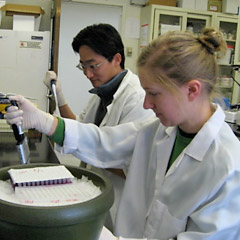
Louisa Harding in the lab with post doc Yoji Yamamoto (photo by P. Swanson).
Louisa Harding
Degree program: MS (Graham Young, advising professor)
Louisa joined SAFS in 2009 and is now studying the effects of environmental contaminants on fish reproduction. Specifically, she is investigating how the chemicals in birth control pills alter expression of genes involved in reproduction in juvenile coho salmon.
When she first contacted Graham, he told Louisa that he didn't have funding to support a graduate student. Louisa said that receiving the scholarship made the difference between coming to SAFS and going elsewhere. She also noted that her Roy Jensen Endowed Fellowship gave her the opportunity to select a project that perfectly matches her research interests.
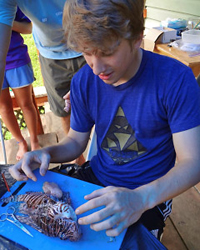
Jeffrey Baldock confronting a lionfish in Panama (photo by N. Rembert).
Jeffrey Baldock
Degree program: BS
Jeffrey was first awarded an undergraduate scholarship in 2012 (the H. Mason Keeler Endowed Scholarship in Fisheries), which supported his participation in the Tropical Island Biodiversity and Conservation Studies program in Bocas del Toro, Panama. His research was focused on tropical coastal ecology and resource management and conservation. Half of his time in the program was spent in the field, gaining hands-on experience.
Jeffrey learned to determine species abundance, percent benthic cover, average carbon stock, and community resource use. He noted these were aspects of the program that he will never forget and that will help him in the future. The highlight of Jeffrey’s time in Panama was a research project that involved investigating the distribution and habitat use of the invasive red lionfish.
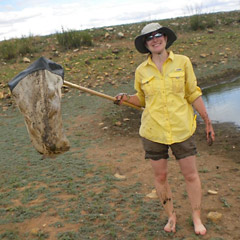
Jessica Hale collecting data during her Capstone research in Arizona (photo by M. Mimms).
Jessica Hale
Degree program: BS (Julian Olden, Capstone adviser)
For her undergraduate Capstone project, Jessica is looking at the effects of monsoon seasonality and invasive bullfrogs on aquatic invertebrate communities in Arizona. After she completes her Capstone, she intends to write a paper about it and publish it in a journal.
The Herbert T. Domenici Endowed Scholarship has allowed Jessica to pursue her studies while worrying less about her finances (she is a primarily self-funded student). Having funding has also allowed her to participate in field projects, such as a black abalone survey last January, and to take a summer class at Friday Harbor Laboratories.
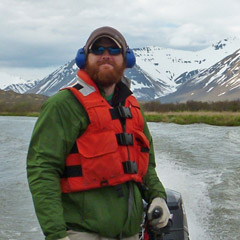
Tim Walsworth in control in the field (photo by J. Griffiths).
Tim Walsworth
Degree program: PhD (Daniel Schindler, advising professor)
Tim is examining the role of species interactions and fisheries management structure on the productivity of an Alaskan salmon fishery, which will help ensure that such fisheries continue to be managed sustainably. This research includes field sampling, operating a remote field station, laboratory work, and computer modeling.
Tim notes that as a recipient of a Richard Whiteleather Endowed Fellowship, he is fortunate not to have to worry about where his tuition payments or stipend will come from, allowing him to focus on his research and class work.

Shelley Johnson about to explore rockfish-shrimp predation at Friday Harbor Labs (photo by H. Williams).
Rachelle (Shelley) Johnson
Degree program: BS (Kevin Turner, graduate mentor)
Shelley’s Galen & Helen Maxfield Endowed Fisheries Scholarship has helped her to cover tuition costs. She spent last fall at Friday Harbor Labs where she took classes and participated in a Marine Environment Research Experience. Her project involved studying predator–prey interactions between rockfish and shrimp in the San Juan Island ecosystem.
Shelley will be an intern at the Pacific Northwest National Laboratory this summer, working with the Ecology Group to examine fish survival during dam passage. This work continues the research she did last summer, which entailed assessing vulnerability of larval white sturgeon to barotrauma as they pass through turbines at dams.
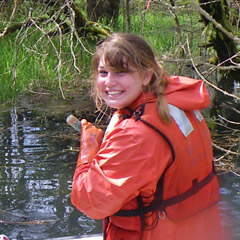
Nicola Follis on the Lewis River as part of her work with the WET (photo by P. Goertle).
Nicola Follis
Degree program: BS (Tom Quinn, Capstone adviser)
Nicola has numerous interests in the field of aquatic and fishery science, and almost everything about aquatic life excites her. However, fish behavioral ecology is her top passion. She is working with Tom Quinn to determine whether coho salmon are attracted to the odors of salmon eggs, and she has also helped out with Wetland Ecosystem Team research on the Lewis River.
Nicola’s Galen & Helen Maxfield Endowed Fisheries Scholarship has given her the financial freedom to participate in volunteer work, invest time into her academics, and devote energy to gathering lab and field experience. She says that her academic direction may have been totally different without the scholarship. She was encouraged to enroll in Marine Biology when she received her entry scholarship and fell in love with the field immediately. Four years later, she graduated with a BS in a major that she may have never found without the scholarship.
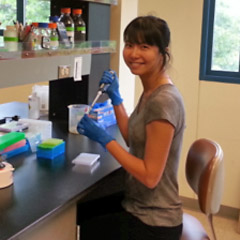
Miyako Kodama in the lab (photo by M. Brieuc).
Miyako Kodama
Degree program: PhD (Kerry Naish, advising professor).
The Clair L. and Evelyn Egtvedt Charitable Trust has given Miyako the freedom and time to pursue research projects she is interested in and to focus on her coursework. Her current research is concerned with understanding how important phenotypic traits are shaped by underlying genetics, and how natural and domestication selection affect such traits in coho salmon. She has been using mapping to detect genomic regions affecting traits related to growth and sexual maturity in this species, and using a population genomic approach to detect any evidence of selection on these regions.
These featured students would not have had such rewarding experiences if it weren’t for the generosity of all our wonderful donors. Your contributions to SAFS endowments enable us to attract the very best students to our program. We invite you to continue your support and make an impact on the areas that matter most to you. No matter what your passion, there is a fund to match. Learn more about the priority funds for the School of Aquatic & Fishery Sciences by selecting below or visit the UW Foundation pages to browse funds (select Aquatic and Fishery Sciences to narrow the list). And for further information on SAFS giving, please visit our giving webpage. Thank you!
André Punt
